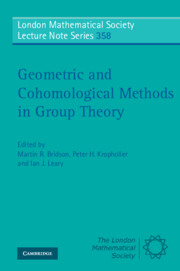Book contents
- Frontmatter
- Contents
- Preface
- List of Participants
- Notes on Sela's work: Limit groups and Makanin-Razborov diagrams
- Solutions to Bestvina & Feighn's exercises on limit groups
- L2-Invariants from the algebraic point of view
- Constructing non-positively curved spaces and groups
- Homology and dynamics in quasi-isometric rigidity of once-punctured mapping class groups
- Hattori-Stallings trace and Euler characteristics for groups
- Groups of small homological dimension and the Atiyah conjecture
- Logarithms and assembly maps on Kn(Zl[G])
- On complete resolutions
- Structure theory for branch groups
Preface
Published online by Cambridge University Press: 07 September 2011
- Frontmatter
- Contents
- Preface
- List of Participants
- Notes on Sela's work: Limit groups and Makanin-Razborov diagrams
- Solutions to Bestvina & Feighn's exercises on limit groups
- L2-Invariants from the algebraic point of view
- Constructing non-positively curved spaces and groups
- Homology and dynamics in quasi-isometric rigidity of once-punctured mapping class groups
- Hattori-Stallings trace and Euler characteristics for groups
- Groups of small homological dimension and the Atiyah conjecture
- Logarithms and assembly maps on Kn(Zl[G])
- On complete resolutions
- Structure theory for branch groups
Summary
More than eighty mathematicians from a variety of countries gathered in Durham in July 2003 for the London Mathematical Society's symposium on Geometry and Cohomology in Group Theory. This was the third symposium in an influential sequence of meetings that began with the meeting organised by Scott and Wall in 1976 and continued with the Kropholler–Stöhr meeting in 1994. As with these previous meetings, the 2003 Symposium attracted many of the world's leading researchers in this highly active field of mathematics.
The meeting came at an exciting time in the field, marked by a deepening of the fertile interactions with logic, analysis and large-scale geometry, as well as striking progress on classical problems at the heart of cohomological group theory. The symposium was built around six lecture courses exposing important aspects of these recent developments. The lecturers were A. Adem, W. Lück, J. McCammond, L. Mosher, R. Oliver, and Z. Sela.
The structure of this volume reflects that of the symposium: major survey articles form the backbone of the book, providing an extended tour through a selection of the most important trends in modern geometric group theory; these are supported by shorter research articles on diverse topics. All of the articles were refereed and we thank the referees for their hard work.
- Type
- Chapter
- Information
- Geometric and Cohomological Methods in Group Theory , pp. vi - viiPublisher: Cambridge University PressPrint publication year: 2009

